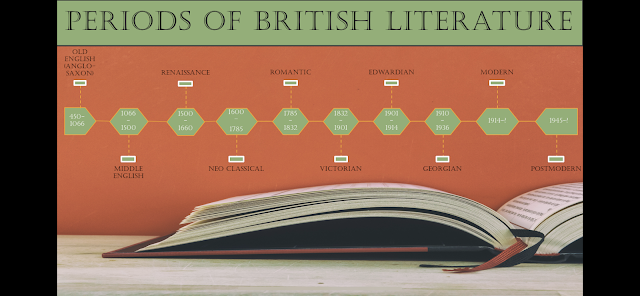Note: The following pictures are screenshots of the lecture and the links underneath the applicable slides will take you to youtube to view the video at was imbedded to the PowerPoint. Between Blogger, PowerPoint, and my computer system, imbedding the PowerPoint presentation with workable (also imbedded) links was becoming a nightmare.
So here we go: British Literature.
Dates denoting eras or periods of literature are generally fluid. When they were specific, it's usually from a definite historical point.
- The Anglo-Saxon period ends in 1066 with the Battle of Hastings when the Anglo-Saxons were defeated by William the Conqueror, replacing/adding to the literary traditions with Norman influence.
- The Romantic Period was a direct response to the societal changes brought on by the Industrial Revolution, so its dates are more fluid on when that literary time period began.
- The Victorian Period coincides with the reign of Queen Victoria, and also those societal changes. Fluid, yet fixed in some regards.
- The Modern and Postmodern Periods both have their beginnings in the World Wars. The literary output is a direct response to living through these times of upheaval. A definite beginning, and yet not having found an end.
So we begin... The Ango-Saxon Period...
What makes the Anglo-Saxon period of literature and language unique?
The literary output is mainly poetry in this era. Typically religious in nature as monks were the literary authority for most of Europe at this point in time. Caedmon and Cynewulf were both liturgical poets. The Venerable Bede, who wrote Ecclesiastical History of the English People in 731 CE, also wrote of Caedmon as the founder of the school of Christian poetry. This poetic period of the Old English/Anglo-Saxon era is known as "Caedmonian."
The page above of the Lindisfarne Gospels is what's known as an illuminated text. Like the Book of Kells, this Lindisfarne Gospels contain the four gospels. Unlike the Book of Kells, which is written in Latin, the Lindisfarne Gospels were written in Old English. The Chi Rho page above is from this manususcript. The picture to the right is a mosaic of the Bede.
The importance of Anglo-Saxon language and literature: (The woman speaking is exceptionally expressive facially, but many noteworthy things to say.)
Next slide is a recitation of Caedmon's Hymn in Old English, a sound completely foreign to us "English" speakers.
Translation:
Now must we praise heaven's kingdom the Keeper
Of the Lord the power and his wisdom
The Work of the Glory-- Father, as he of marvels each,
The eternal Lord, the beginning established.
He first created of earth for the sons
Heaven as a roof, the Holy Creator
Then the middle-enclosure of mankind the Protector
The eternal Lord, thereafter made
For men, earth the Lord Almighty.
Other than the poetry of this era, we have the greatest epic tales of all time... Beowulf.
Epics and Heroes, Beowulf set the pattern for all subsequent epic tales.













No comments:
Post a Comment